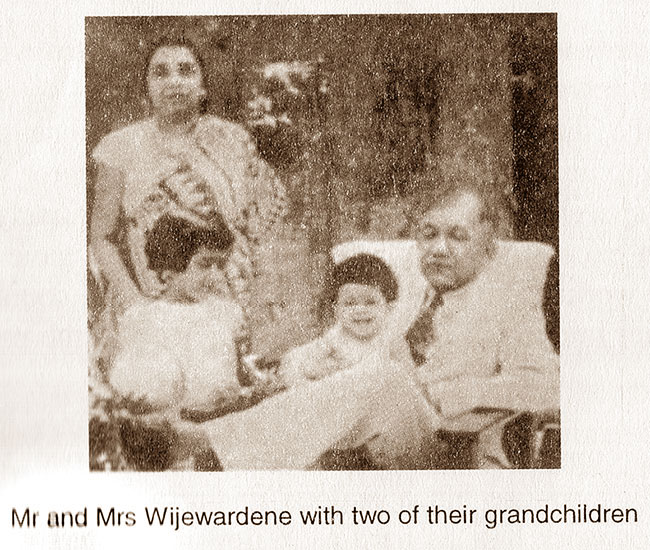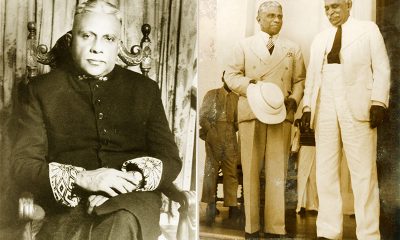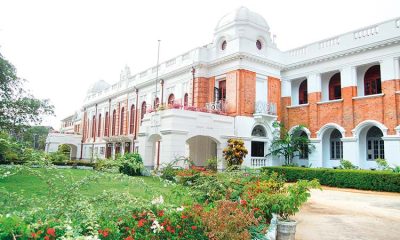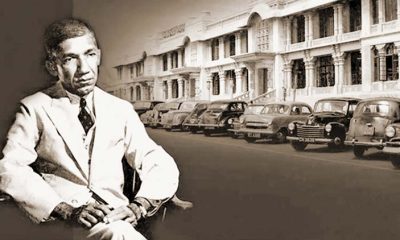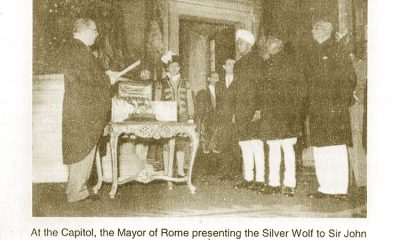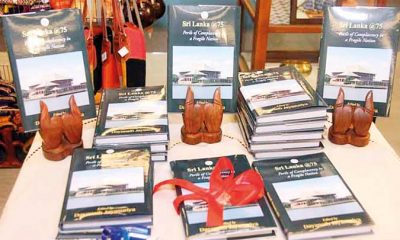Features
D. R Wijewardene 1886-1950, newspaper baron and all time great in the struggle for Independence

CHIEFS AND FRIENDS
(Excerpted from Selected Journalism by HAJ Hulugalle)
Don Richard Wijewardene was one of the formative influences of our times. Had he died in his early youth, the history of Ceylon during the past 30 years might well have been different. He was not merely a powerful newspaper proprietor, though to be one was a considerable achievement as never before had a Ceylonese succeeded in establishing a newspaper on a sound business foundation.
Lorenz tried with the “Examiner.” Hector Van Cuylenberg with the “Independent,” the de Soysa family with the “Standard” and the “Morning Leader” and Sir P. Ramanathan and the Jayewardene brothers with the “Ceylonese.” Each of them had some measure of success but none on the same scale and of the duration of Wijewardene’s great enterprise.
D. R. Wijewardene was first and last a patriot. It was the love of his country which led him to prepare, as a student in England, for his life’s work. It was his realization that the struggle for independence was the one most worthy of a wealthy young man’s energies that guided him to politics. Although he possessed a strong personality he had not sufficient confidence in his ability to excel in debate or sway crowds by power of speech. He chose the far more effective method of influencing men by establishing newspapers, among the best in Asia and published in the national languages as well as in English.
He was the third son in a family of nine and was born at Sedawatte, where his father, the late Muhandiram D.P. Wijewardene, a wealthy merchant and contractor, lived within easy reach of Colombo, where he had a very successful business. Richard Wijewardene was educated at St. Thomas’ College when Read was Warden and the Rev. G. A. H. Arndt was Sub-Warden. His teachers included Swinburne, Meynert, J. S. H. Edirisinghe, C V_ Pereira and E. Navaratnam. Among his contemporaries were D. S. Senanayake and Francis Molamure.
From St. Thomas’, Wejewardene went to Peterhouse, Cambridge. He has told us that it was in his undergraduate days at Cambridge that his interest in politics began. “There was a wave of unrest in India, as a result of Lord Curzon’s action in partitioning Bengal, and prominent Indian leaders came over to England and addressed meetings to enlighten the British public on the situation in their country.
Among them there was Lala Lajpat Rai, a great nationalist and scholar, who had been deported under an obsolete law. Bepin Chandra Pal and Surendranath Banerji, generally known as the silver-tongued orator of Bengal, drew large audiences.
There came to England also Mr. Gopal Krishna Gokhale, a member of the Imperial Legislative Council, a statesman who made great sacrifices in the service of his country. He impressed on me that every educated young man, Indian or Ceylonese, had a part to play in the public life of his country and must be prepared to make sacrifices for his country’s welfare.
I met Gokhale often at the National Liberal Club and had many long and interesting talks with him on political questions of the day. He asked me to accompany him on his great mission to South Africa as one of his secretaries. To my great regret I was not able to accept the invitation.”
Wijewardene’s friend and mentor during his student life in England was F. H. M. Corbet, an influential barrister with Ceylon connections. Among those who worked in Corbet’s chambers at the time, and whom Wijewardene met frequently, were Patrick Hastings, later to become Attorney-General of England and Brooke Eliott, who practised in Ceylon and Madras. Corbet had many friends in the House of Commons and showed him the ropes “in the delicate task of interesting Members of Parliament in the domestic affairs of a Crown Colony.”
Wijewardene organized the first Reforms deputation to be received by Colonel Seely (afterwards Lord Mottistone) on behalf of the Secretary of State for the Colonies, the Marquis of Crewe. The deputation was led by Mr. H. J. C. Pereira K. C., and included Mr. E.W. Perera. Wijewardene organized a second deputation two years later, this time to meet Mr. Lewis Harcourt, the Secretary of State. He induced Sir Baron Jayatilaka and Sir Marcus Fernando to join it.
On his return to the Island from the exhilarating atmosphere of British politics, Wijewardene found local conflicts distinctly parochial. He was not interested in a career at the Bar, but to Hultsdorp he went because it was there that all political movements were set afoot. Ponnambalam Ramanathan and James Peiris had retired from the Bar but H. J. C. Pereira, Hector Jayewardene, E.J. Samarawickrame, Francis de Zoysa, R. L. Pereira, E. W. Perera, D. B. Jayatilaka, and younger men like E. T. de Silva and M. A. Arulanandam, were knocking at the door of the political arena. But there was only one seat in the legislature to which they could have aspired, the so called Educated Ceylonese Seat, to which Sir Ponnambalam Ramanathan had been elected.
The riots in 1915 were suppressed in a brutal manner and political agitation was prohibited by a strict censorship. As soon as this was relaxed D. R. Wijewardene, who had resigned his commission in the Ceylon Light Infantry, re-organized the Ceylon National Association. He persuaded Sir Ponnambalam Arunachalam who had retired from the Civil Service to deliver an address on “Our Political Needs.
” The outcome of this was the formation of the Ceylon Reform League, formed for the purpose of putting forward the case for a substantial measure of responsible government for Ceylon. D. R. Wijewardene was joint Secretary of the League with W. A. de Silva. The Ceylon National Congress was formed the next year under the presidentship of Sir P. Arunachalam.
Wijewardene also helped Arunachalam and James Peiris to organize the Ceylon Social Service League and was one of its joint secretaries. He had so impressed the older politicians by his remarkable grasp of current affairs and organizing capacity that he was always in the inner councils of the Reform movement. On one occasion Sir Ponnambalam Arunachalam wound up his presidential address to the National Congress with a tribute to Mr. Wijewardene who, he said, always worked quietly “like a process of nature.”
D. R. Wijewardene’s major contribution was the moulding of public opinion through the highly successful newspapers he conducted. Their success was due not only to business ability and political knowledge but even in greater measure to a flair for journalism. Although he had never been a reporter or political correspondent he was always the best news-gatherer of his papers. Though he very rarely put pen to paper, the columnists and leader-writers were inspired and encouraged by his uncanny gift of reading the public mind. One of his staff would sometimes feel that the public would not stand for the line taken by him on some controversial issue but “The Chief’ was usually proved correct.
D. R. Wijewardene’s interest in journalism was stimulated by daily reading of the London “Daily News” then edited by A. G. Gardiner. Among the regular contributors to that paper were Arnold Bennet, G. K. Chesterton, Spencer Leigh Hughes and Charles Masterman. When he founded a newspaper himself, Wijewardene called it the “Ceylon Daily News.” In the meantime he owned a half share in a Sinhalese newspaper called the “Dinamina” published from Norris Road in which D. B. (later Sir Baron) Jayatilaka wrote most of the editorials.
The “Ceylon Daily News” was and remains the keystone of the edifice which Wijewardene built up. Writing on its twenty-fifth birthday, the late Orion de Zylva, one of its brilliant staff, wrote:
“When the ‘Daily News’ was published on January 3, 1918, certain ideals were aimed at. To turn these ideals into a deed required in the doer a spirit of determination and high adventure.
“The way of Ceylonese journalism up to that time was for the most part crazy-paved with broken fortunes and shattered hopes. To make the prospect even more discouraging the “Ceylonese,” launched a few years earlier by a group of able and patriotic men with a confidence sustained by hope, had only recently failed. But Mr. Wijewardene was not deterred by these unhappy omens. Purchasing the plant and machinery of the “Ceylonese” and engaging the services of some of its staff and other competent assistants he boldly started the enterprise he had planned and which his powers of organization were to develop into a mighty force for the country’s good.
“In achieving this, he proved that any person possessed of perseverance and drive and fired by an intense desire to attain an ideal could not only command success in business but that he could make a success of a business of the most intricate and complicated kind involved in the running of several newspapers.
“To Mr. Wijewardene’s everlasting credit let it be remembered that he dared and executed what was nothing less than a constructive revolution in journalism such as it had been up to the time he entered the field. The “Daily News” was to be a newspaper with a soul. Though with convictions and opinions of its own, it was to give a fair show always to other convictions and opinions. It was meant to appeal to all thoughtful men and women anxious for the country’s welfare and advancement irrespective of race or creed.”
D. R. Wijewardene bought the assets of the “Ceylonese” for Rs. 20,000. He bought the “Ceylon Observer” and Ferguson’s Directory for a lakh and twenty thousand rupees from a syndicate financed by the late W. H. Figg and representing the European Association.
He leaves a group of half a dozen newspapers, in a palatial home equipped as well as any newspaper organization in the East and giving to the readers daily in all the languages of the country “all the news that’s fit toprint,” independent views, a valuable medium of culture and an indispensable arena of public debate. For 30 years he gave himself up fiercely and wholeheartedly to the exacting business of conducting these journals.
At the start there were many financial and other problems. The “Daily News”first came to life under the shadow of a war censorship. Paper was difficult to get and shipments were uncertain owing to the German submarine campaign. There were already two other English morning newspapers in the field and the editor of one of them, the late Armand de Souza, a redoubtable journalist, was then in his prime. Wijewardene took the bold step of cutting the price of the “Daily News” to five cents when the rival papers were charging ten cents.
The older proprietors and editors did not encourage special articles from outside contributors. Wijewardene did so. Leading men in every walk of life took pride and pleasure in writing for the paper. Contracts were made with well-known English publicists fora regular flow of articles into its columns. Reuters were pressed and paid to improve their services and the London office of the paper was strengthened both from the business and editorial angles. Sir Baron Jayatilaka introduced Frederick Grubb who became London correspondent for 15 years.
Development of the newspaper enterprise meant investment of large sums of money. There was no Bank of Ceylon then and some of the European banks would not lend without the guarantee of a shroff. Wijewardene had often to mortgage his private property to finance the business. The Associated Newspapers of Ceylon Limited, was incorporated after the “Observer” was purchased and the new building was put up at a cost of two lakhs – nowadays a trifling sum – raised by a debenture issue. There were anxious times as during the great depression when advertising revenue sank to small proportions.
Wijewardene was a good judge of men and did not, unfortunately, suffer fools gladly. This and his success sometimes gave him a reputation for arrogance. But it was his natural shyness and dislike of the limelight which made him something of a man of mystery, a “dens ex machine.” He always had loyal workers, men who were ready to be driven hard because they respected his integrity and devotion to duty.
S.J.K. Crowther, whom he had known in England, joined him in 1919 as editor of the “Daily News” and continued in that position until 1931. The partnership was a happy and fruitful one and helped to lay the solid foundations on which the paper stands. But no man worked harder than Wijewardene himself. Even after he bought his delightful house in Diyatalawa he found little time for relaxation and those who went up with him for the week-end were always aware that he had not left his worries behind.
His cares and anxieties were of various kinds and he seemed to enjoy them as some people enjoy a drug. He was always bothered about public affairs and kept in touch with them by telephoning his few political friends. He was a student all his life and was constantly digging into official publications to discover subjects for editorials. He had a habit of extracting information about various matters from persons he met at weddings, funerals or in the course of his walks round Victoria Park. Whatever the question under public controversy, he had a reliable informant who gave him the background.
He was sometimes misinformed, but was never afraid to form an independent opinion regardless of personal relationships. Part of the reasons for the life of a recluse he led was that he tried to be free from influences which might sway him from the path of duty as a newspaper man. As a politician he had been brought up as a liberal with strong radical leanings, and this he remained to the last. When Ceylon got her independence the Prime Minister paid a well-deserved tribute to him as one of the architects of the country’s freedom.
Wijewardene was incapable of disconnecting from the switchboard of a newspaper’s ramifications. He would sometimes get up from the dinner table and go to the telephone to make a suggestion to an editor or to inquire from a sub-editor whether an important speech in the legislature had been adequately reported. He was an exceptionally able businessman and gave the major part of his working hours to the dull details of the counting house but his chief interest in journalism was news and the moulding of opinion.
For a conscientious proprietor a newspaper is not an understanding spouse but a jealous mistress. Lord Beaverbrook, who did not work half as hard as Wijewardene has written: “The business of producing a newspaper requires a type of mind which is very rare indeed. You Must he ready to put your whole heart and soul, your stomach, your liver, your whole anatomy, into a task which will appear most of the time to be dangerously stimulating and occasionally positively revolting.” (Millionaires and their Newspapers – Humbug and Ignorance)
It is not Lake House that will be a monument to the life of D.R. Wijewardene. The enduring monument will be his contribution to the building of the nation. He was not a man without faults. He was not often prepared to see the other side of a question. He was not always tolerant. He was frequently too preoccupied with his own problems to give a thought to the problems of even his nearest colleagues.
He relaxed so rarely that he had almost driven laughter out of his life until his health broke down and he was compelled to abandon his work. But at heart he was a kindly man. It is possible that he regretted nothing more in his later years than the hours he stole from his home and his friends and sacrificed to his business. He loved books, pictures, trees and flowers, but he denied himself of the pleasures they give. There is no respite for mortal creatures. Even a noble achievement must be paid for. By the death of D. R. Wijewardene, six years short of the Psalmist’s span, Ceylon loses one of its few great men.
Features
When Batting Was Poetry: Remembering David Gower
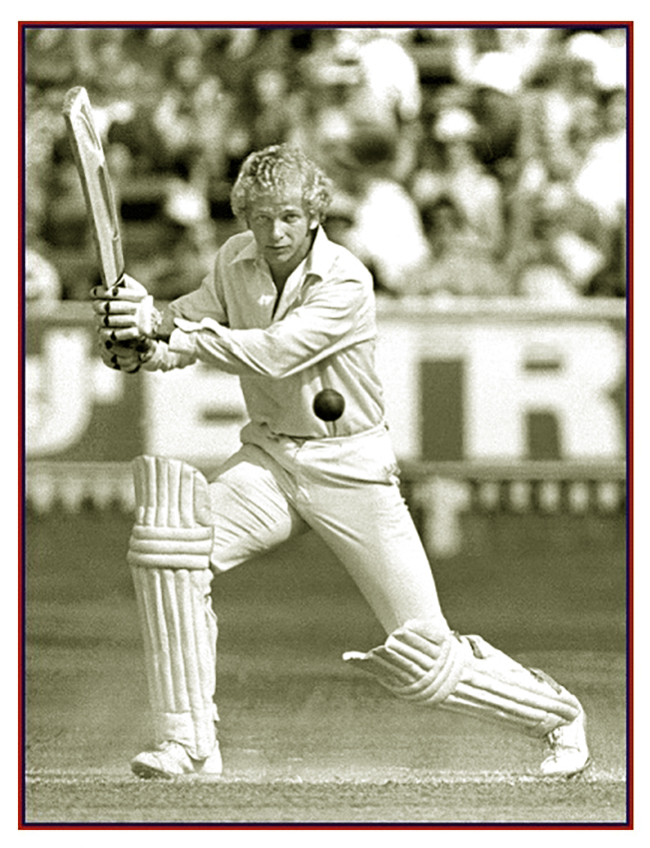
For many Sri Lankans growing up in the late nineteen fifties and early sixties, our cricketing heroes were Englishmen. I am not entirely sure why that was. Perhaps it was a colonial hangover, or perhaps it reflected the way cricket was taught locally, with an emphasis on technical correctness, a high left elbow, and the bat close to the pad. English cricket, with its traditions and orthodoxy, became the benchmark.
I, on the other hand, could not see beyond Sir Garfield Sobers and the West Indian team. Sir Garfield remains my all-time hero, although only by a whisker ahead of Muttiah Muralitharan. For me, Caribbean flair and attacking cricket were infinitely superior to the Englishmen’s conservatism and defensive approach.
That said, England has produced many outstanding cricketers, with David Gower and Ian Botham being my favourites. Players such as Colin Cowdrey, Tom Graveney, Mike Denness, Tony Lewis, Mike Brealey, Alan Knott, Derek Underwood, Tony Greig, and David Gower were great ambassadors for England, particularly when touring the South Asian subcontinent, which posed certain challenges for touring sides until about three decades ago. Their calm and dignified conduct when touring is a contrast to the behaviour of the current lot.
I am no longer an avid cricket viewer, largely because my blood pressure tends to rise when I watch our Sri Lankan players. Therefore, I was pleasantly surprised recently when I was flipping through the TV channels to hear David Gower’s familiar voice commentating. It brought back fond memories of watching him bat during my time in the UK. I used to look forward to the summer for two reasons. To feel the sun on my back and watch David Gower bat!
A debut that announced a star
One of my most vivid cricketing memories is watching, in 1978, a young English batsman pull the very first ball he faced in Test cricket to the boundary. Most debutants play cautiously, trying to avoid the dreaded zero, but Gower nonchalantly swivelled and pulled a short ball from Pakistan’s Liaquat Ali for four. It was immediately apparent that a special talent had arrived.
To place that moment in perspective, Marvan Atapattu—an excellent Sri Lankan batsman—took three Tests and four innings to score his first run, yet later compiled 16 Test centuries.
Gower went on to score 56 in his first innings and captivated spectators with his full repertoire of strokes, particularly his exquisite cover drive. It is often said that a left-hander’s cover drive is one of the most pleasurable sights in cricket, and watching Sobers, Gower, or Brian Lara execute the cover drive made the entrance ticket worthwhile.
A young talent in a time of change
Gower made his Test debut at just 21, rare for an English player of that era. World cricket was in turmoil due to the Kerry Packer revolution, and England had lost senior players such as Tony Greig, Alan Knott, and Derek Underwood. Selectors were searching for young talent, and Gower’s inclusion injected fresh impetus.
Gower scored his first Test century in only his fourth match, just a month after his debut, against New Zealand, and a few months later scored his maiden Ashes century at Perth.
He finished with 18 Test centuries from 117 matches. His finest test innings, in my view, was the magnificent 154 not out at Kingston in 1981 against Holding, Marshall, Croft, and Garner. Batting for nearly eight hours and facing 403 balls, he set aside flair for determination to save the Test.
He and Ian Botham also benefited from playing their initial years under Mike Brealey, an average batsman but an outstanding leader. Rodney Hogg, the Australian fast bowler, famously said Brealey had a ‘degree in people’, and both young stars flourished under his guidance.
Captaincy and criticism and overall record
Few English batsmen delighted and frustrated spectators and analysts as much as Gower. The languid cover drive, so elegant and so pleasurable to the spectators, also resulted in a fair number of dismissals that, at times, gave the impression of carelessness to both spectators and journalists.
Despite his approach, which at times appeared casual, he was appointed as captain of the English team in 1983 and served for three years before being removed in 1986. He was again appointed captain in 1989 for the Ashes series. He led England in 1985 to a famous Ashes series win as well as a series win in India in1984-85.
In the eyes of some, the captaincy might not have been the best suited to his style of play. However, he scored 732 runs whilst captaining the team during the 1985 Ashes series, proving that he was able handle the pressure.
Under Gower, England lost two consecutive series to the great West Indian teams 5-0, which led to the coining of the phrase “Blackwashed”! He was somewhat unlucky that he captained the English team when the West Indies were at the peak, possessing a fearsome array of fast bowlers.
David Gower scored 3,269 test runs against Australia in 42 test matches. He scored nine centuries and 12 fifties, averaging nearly 45 runs per inning. His record against Australia as an English batsman is only second to Sir Jack Hobbs. Scoring runs against Australia has been a yardstick in determining how good a batsman is. Therefore, his record against Australia can easily rebut the critics who said that he was too casual. He scored 8,231 runs in 117 test matches and 3,170 runs in 114 One Day Internationals.
A gentleman of the game free of controversies
Unlike the other great English cricketer at the time, Ian Botham, David was not involved in any controversies during his illustrious career. The only incident that generated negative press was a low-level flight he undertook in a vintage Tiger Moth biplane in Queensland during the 1990-91 Ashes tour of Australia. The team management and the English press, as usual, made a mountain out of a molehill. David retired from international cricket in 1992.
In 1984, during the tour of India, due to the uncertain security situation after the assassination of the then Indian Prime Minister Indira Gandhi, the English team travelled to Sri Lanka for a couple of matches. I was fortunate enough to get David to sign his book “With Time to Spare”. This was soon after he returned to the pavilion after being dismissed. There was no refusal or rudeness when I requested his signature.
He was polite and obliged despite still being in pads. Although I did not know David Gower, his willingness that day to oblige a spectator exemplified the man’s true character. A gentleman who played the game as it should be, and a great ambassador of England and world cricket. He was inducted into the ICC Cricket Hall of Fame in 2009 and appointed an Officer of the Order of the British Empire (OBE) in 1992 for his services to sport.
By Sanjeewa Jayaweera
Features
Sri Lanka Through Loving Eyes:A Call to Fix What Truly Matters

Love of country, pride, and the responsibility to be honest
I am a Sri Lankan who has lived in Australia for the past 38 years. Australia has been very good to my family and me, yet Sri Lanka has never stopped being home. That connection endures, which is why we return every second year—sometimes even annually—not out of nostalgia, but out of love and pride in our country.
My recent visit reaffirmed much of what makes Sri Lanka exceptional: its people, culture, landscapes, and hospitality remain truly world-class. Yet loving one’s country also demands honesty, particularly when shortcomings risk undermining our future as a serious global tourism destination.
When Sacred and Iconic Sites Fall Short
One of the most confronting experiences occurred during our visit to Sri Pada (Adam’s Peak). This sacred site, revered across multiple faiths, attracts pilgrims and tourists from around the world. Sadly, the severe lack of basic amenities—especially clean, accessible toilets—was deeply disappointing. At moments of real need, facilities were either unavailable or unhygienic.
This is not a luxury issue. It is a matter of dignity.
For a site of such immense religious and cultural significance, the absence of adequate sanitation is unacceptable. If Sri Lanka is to meet its ambitious tourism targets, essential infrastructure, such as public toilets, must be prioritized immediately at Sri Pada and at all major tourist and pilgrimage sites.
Infrastructure strain is also evident in Ella, particularly around the iconic Nine Arches Bridge. While the attraction itself is breathtaking, access to the site is poorly suited to the sheer volume of visitors. We were required to walk up a steep, uneven slope to reach the railway lines—manageable for some, but certainly not ideal or safe for elderly visitors, families, or those with mobility challenges. With tourist numbers continuing to surge, access paths, safety measures, and crowd management urgently needs to be upgraded.
Missed opportunities and first impressions
Our visit to Yala National Park, particularly Block 5, was another missed opportunity. While the natural environment remains extraordinary, the overall experience did not meet expectations. Notably, our guide—experienced and deeply knowledgeable—offered several practical suggestions for improving visitor experience and conservation outcomes. Unfortunately, he also noted that such feedback often “falls on deaf ears.” Ignoring insights from those on the ground is a loss Sri Lanka can ill afford.
First impressions also matter, and this is where Bandaranaike International Airport still falls short. While recent renovations have improved the physical space, customs and immigration processes lack coherence during peak hours. Poorly formed queues, inconsistent enforcement, and inefficient passenger flow create unnecessary delays and frustration—often the very first experience visitors have of Sri Lanka.
Excellence exists—and the fundamentals must follow
That said, there is much to celebrate.
Our stays at several hotels, especially The Kingsbury, were outstanding. The service, hospitality, and quality of food were exceptional—on par with the best anywhere in the world. These experiences demonstrate that Sri Lanka already possesses the talent and capability to deliver excellence when systems and leadership align.
This contrast is precisely why the existing gaps are so frustrating: they are solvable.
Sri Lankans living overseas will always defend our country against unfair criticism and negative global narratives. But defending Sri Lanka does not mean remaining silent when basic standards are not met. True patriotism lies in constructive honesty.
If Sri Lanka is serious about welcoming the world, it must urgently address fundamentals: sanitation at sacred sites, safe access to major attractions, well-managed national parks, and efficient airport processes. These are not optional extras—they are the foundation of sustainable tourism.
This is not written in criticism, but in love. Sri Lanka deserves better, and so do the millions of visitors who come each year, eager to experience the beauty, spirituality, and warmth that our country offers so effortlessly.
The writer can be reached at Jerome.adparagraphams@gmail.com
By Jerome Adams
Features
Seething Global Discontents and Sri Lanka’s Tea Cup Storms
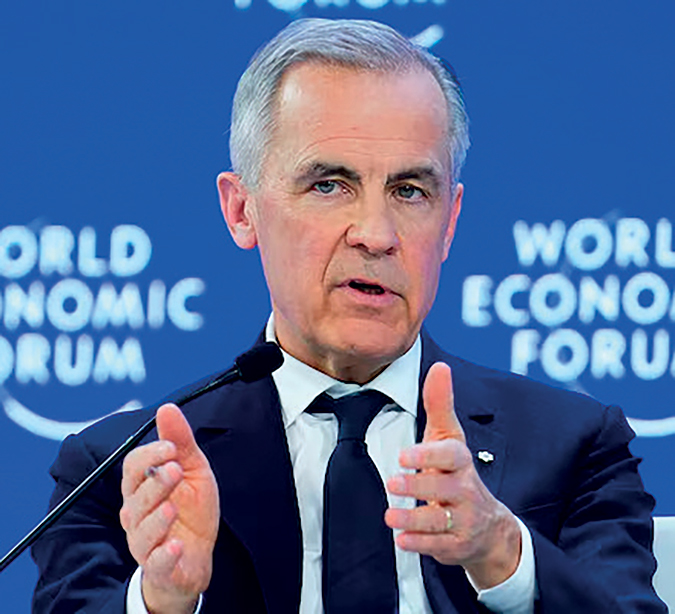
Global temperatures in January have been polar opposite – plus 50 Celsius down under in Australia, and minus 45 Celsius up here in North America (I live in Canada). Between extremes of many kinds, not just thermal, the world order stands ruptured. That was the succinct message in what was perhaps the most widely circulated and listened to speeches of this century, delivered by Canadian Prime Minister Mark Carney at Davos, in January. But all is not lost. Who seems to be getting lost in the mayhem of his own making is Donald Trump himself, the President of the United States and the world’s disruptor in chief.
After a year of issuing executive orders of all kinds, President Trump is being forced to retreat in Minneapolis, Minnesota, by the public reaction to the knee-jerk shooting and killing of two protesters in three weeks by federal immigration control and border patrol agents. The latter have been sent by the Administration to implement Trump’s orders for the arbitrary apprehension of anyone looking like an immigrant to be followed by equally arbitrary deportation.
The Proper Way
Many Americans are not opposed to deporting illegal and criminal immigrants, but all Americans like their government to do things the proper way. It is not the proper way in the US to send federal border and immigration agents to swarm urban neighbourhood streets and arrest neighbours among neighbours, children among other school children, and the employed among other employees – merely because they look different, they speak with an accent, or they are not carrying their papers on their person.
Americans generally swear by the Second Amendment and its questionably interpretive right allowing them to carry guns. But they have no tolerance when they see government forces turn their guns on fellow citizens. Trump and his administration cronies went too far and now the chickens are coming home to roost. Barely a month has passed in 2026, but Trump’s second term has already run into multiple storms.
There’s more to come between now and midterm elections in November. In the highly entrenched American system of checks and balances it is virtually impossible to throw a government out of office – lock, stock and barrel. Trump will complete his term, but more likely as a lame duck than an ordering executive. At the same time, the wounds that he has created will linger long even after he is gone.
Equally on the external front, it may not be possible to immediately reverse the disruptions caused by Trump after his term is over, but other countries and leaders are beginning to get tired of him and are looking for alternatives bypassing Trump, and by the same token bypassing the US. His attempt to do a Venezuela over Greenland has been spectacularly pushed back by a belatedly awakening Europe and America’s other western allies such as Australia, Canada and New Zealand. The wags have been quick to remind us that he is mostly a TACO (Trump always chickens out) Trump.
Grandiose Scheme or Failure
His grandiose scheme to establish a global Board of Peace with himself as lifetime Chair is all but becoming a starter. No country or leader of significant consequence has accepted the invitation. The motley collection of acceptors includes five East European countries, three Central Asian countries, eight Middle Eastern countries, two from South America, and four from Asia – Cambodia, Vietnam, Indonesia and Pakistan. The latter’s rush to join the club will foreclose any chance of India joining the Board. Countries are allowed a term of three years, but if you cough up $1 billion, could be member for life. Trump has declared himself to be lifetime chair of the Board, but he is not likely to contribute a dime. He might claim expenses, though. The Board of Peace was meant to be set up for the restoration of Gaza, but Trump has turned it into a retirement project for himself.
There is also the ridiculous absurdity of Trump continuing as chair even after his term ends and there is a different president in Washington. How will that arrangement work? If the next president turns out to be a Democrat, Trump may deny the US a seat on the board, cash or no cash. That may prove to be good for the UN and its long overdue restructuring. Although Trump’s Board has raised alarms about the threat it poses to the UN, the UN may end up being the inadvertent beneficiary of Trump’s mercurial madness.
The world is also beginning to push back on Trump’s tariffs. Rather, Trump’s tariffs are spurring other countries to forge new trade alliances and strike new trade deals. On Tuesday, India and EU struck the ‘mother of all’ trade deals between them, leaving America the poorer for it. Almost the next day , British Prime Minister Sir Keir Starmer and Chinese leader Xi Jinping announced in Beijing that they had struck a string of deals on travel, trade and investments. “Not a Big Bang Free Trade Deal” yet, but that seems to be the goal. The Canadian Prime Minister has been globe-trotting to strike trade deals and create investment opportunities. He struck a good reciprocal deal with China, is looking to India, and has turned to South Korea and a consortium from Germany and Norway to submit bids for a massive submarine supply contract supplemented by investments in manufacturing and mineral industries. The informal first-right-of-refusal privilege that US had in Canada for defense contracts is now gone, thanks to Trump.
The disruptions that Trump has created in the world order may not be permanent or wholly irreversible, as Prime Minister Carney warned at Davos. But even the short term effects of Trump’s disruptions will be significant to all of US trading partners, especially smaller countries like Sri Lanka. Regardless of what they think of Trump, leaders of governments have a responsibility to protect their citizens from the negative effects of Trump’s tariffs. That will be in addition to everything else that governments have to do even if they do not have Trump’s disruptions to deal with.
Bland or Boisterous
Against the backdrop of Trump-induced global convulsions, politics in Sri Lanka is in a very stable mode. This is not to diminish the difficulties and challenges that the vast majority of Sri Lankans are facing – in meeting their daily needs, educating their children, finding employment for the youth, accessing timely health care and securing affordable care for the elderly. The challenges are especially severe for those devastated by cyclone Ditwah.
Politically, however, the government is not being tested by the opposition. And the once boisterous JVP/NPP has suddenly become ‘bland’ in government. “Bland works,” is a Canadian political quote coined by Bill Davis a nationally prominent premier of the Province of Ontario. Davis was responding to reporters looking for dramatic politics instead of boring blandness. He was Premier of Ontario for 14 years (1971-1985) and won four consecutive elections before retiring.
No one knows for how long the NPP government will be in power in Sri Lanka or how many more elections it is going to win, but there is no question that the government is singularly focused on winning the next parliamentary election, or both the presidential and parliamentary elections – depending on what happens to the system of directly electing the executive president.
The government is trying to grow comfortable in being on cruise control to see through the next parliamentary election. Its critics on the other hand, are picking on anything that happens on any day to blame or lampoon the government. The government for all its tight control of its members and messaging is not being able to put out quickly the fires that have been erupting. There are the now recurrent matters of the two AGs (non-appointment of the Auditor General and alleged attacks on the Attorney General) and the two ERs (Educational Reform and Electricity Reform), the timing of the PC elections, and the status of constitutional changes to end the system of directly electing the president.
There are also criticisms of high profile resignations due to government interference and questionable interdictions. Two recent resignations have drawn public attention and criticism, viz., the resignation of former Air Chief Marshal Harsha Abeywickrama from his position as the Chairman of Airport & Aviation Services, and the earlier resignation of Attorney-at-Law Ramani Jayasundara from her position as Chair of the National Women’s Commission. Both have been attributed to political interferences. In addition, the interdiction of the Deputy Secretary General of Parliament has also raised eyebrows and criticisms. The interdiction in parliament could not have come at a worse time for the government – just before the passing away of Nihal Seniviratne, who had served Sri Lanka’s parliament for 33 years and the last 13 of them as its distinguished Secretary General.
In a more political sense, echoes of the old JVP boisterousness periodically emanate in the statements of the JVP veteran and current Cabinet Minister K.D. Lal Kantha. Newspaper columnists love to pounce on his provocative pronouncements and make all manner of prognostications. Mr. Lal Kantha’s latest reported musing was that: “It is true our government is in power, but we still don’t have state power. We will bring about a revolution soon and seize state power as well.”
This was after he had reportedly taken exception to filmmaker Asoka Handagama’s one liner: “governing isn’t as easy as it looks when you are in the opposition,” and allegedly threatened to answer such jibes no matter who stood in the way and what they were wearing “black robes, national suits or the saffron.” Ironically, it was the ‘saffron part’ that allegedly led to the resignation of Harsha Abeywickrama from the Airport & Aviation Services. And President AKD himself has come under fire for his Thaipongal Day statement in Jaffna about Sinhala Buddhist pilgrims travelling all the way from the south to observe sil at the Tiisa Vihare in Thayiddy, Jaffna.
The Vihare has been the subject of controversy as it was allegedly built under military auspices on the property of local people who evacuated during the war. Being a master of the spoken word, the President could have pleaded with the pilgrims to show some sensitivity and empathy to the displaced Tamil people rather than blaming them (pilgrims) of ‘hatred.’ The real villains are those who sequestered property and constructed the building, and the government should direct its ire on them and not the pilgrims.
In the scheme of global things, Sri Lanka’s political skirmishes are still teacup storms. Yet it is never nice to spill your tea in public. Public embarrassments can be politically hurtful. As for Minister Lal Kantha’s distinction between governmental mandate and state power – this is a false dichotomy in a fundamentally practical sense. He may or may not be aware of it, but this distinction quite pre-occupied the ideologues of the 1970-75 United Front government. Their answer of appointing Permanent Secretaries from outside the civil service was hardly an answer, and in some instances the cure turned out to be worse than the disease.
As well, what used to be a leftist pre-occupation is now a right wing insistence especially in America with Trump’s identification of the so called ‘deep state’ as the enemy of the people. I don’t think the NPP government wants to go there. Rather, it should show creative originality in making the state, whether deep or shallow, to be of service to the people. There is a general recognition that the government has been doing just that in providing redress to the people impacted by the cyclone. A sign of that recognition is the number of people contributing to the disaster relief fund and in substantial amounts. The government should not betray this trust but build on it for the benefit of all. And better do it blandly than boisterously.
by Rajan Philips
-

 Business7 days ago
Business7 days agoComBank, UnionPay launch SplendorPlus Card for travelers to China
-

 Business4 days ago
Business4 days agoClimate risks, poverty, and recovery financing in focus at CEPA policy panel
-

 Opinion3 days ago
Opinion3 days agoSri Lanka, the Stars,and statesmen
-

 Business2 days ago
Business2 days agoHayleys Mobility ushering in a new era of premium sustainable mobility
-

 Opinion7 days ago
Opinion7 days agoLuck knocks at your door every day
-

 Business2 days ago
Business2 days agoAdvice Lab unveils new 13,000+ sqft office, marking major expansion in financial services BPO to Australia
-

 Business2 days ago
Business2 days agoArpico NextGen Mattress gains recognition for innovation
-

 Business21 hours ago
Business21 hours agoAltair issues over 100+ title deeds post ownership change

